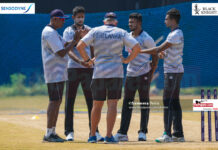Paul Collingwood reflects on satisfaction of having coached Scotland to ICC Cricket World Cup Qualifier win and what it’s like working with team as an Englishman
One of the things that has really struck me over the past few years is the amazing way cricket is developing around the world. Although more needs to be done, the ICC has played an important role in spreading the game across the globe.
I recently found out that there are over 1.1 million cricket participants outside the Full Members. An impressive number that keeps growing all the time.
The funding Associate nations get once they qualify for big international events makes such a difference. It’s wonderful to see teams like Nepal, Hong Kong and Papua New Guinea coming up, and the finance and competition structures provided by the ICC are key to this happening.
There are rules in place, so that nowadays Associate nations have the opportunity to come up and play Test cricket and that is so important. Whether you’re a young player or an Associate team, you need ambition and it’s a huge goal to become a Test nation.
I have some experience of Associate teams, thanks to my time working with Scotland. I was contacted last year and asked to come on board for the ICC World Twenty20 Qualifier 2013 and the ICC Cricket World Cup Qualifier 2014.
Being with Durham, you have five months off through the winter and it was a chance to look at other avenues. It was a fantastic opportunity and it proved to be a successful time for all of us.
I was assistant coach for the T20s but the head coach, Peter Steindl, resigned after those, and I was persuaded to take on the full role alongside the bowling coach Craig Wright. We put our heads together and it was fantastic to help them through the qualifiers in New Zealand.
I’ve played a lot of international cricket and I’m a coach that thinks a lot about the mental side of the game, trying to take pressure off the players. It is a high-pressure environment and it’s important that players are as relaxed as possible out on the park.
It was an emotional rollercoaster playing at the ICC Cricket World Cup Qualifier 2014 and understanding what it meant to Scotland to qualify. If they hadn’t qualified, they could have lost ODI status and probably their contracts. It was cut-throat stuff and thankfully, we came through with flying colours under the greatest pressure.
Once we had qualified, it felt like unfinished business and I’m delighted to be involved again for the ICC Cricket World Cup 2015.
One of the things I said to the Scotland team when I got the head coach role was that I’d played against Ireland for many years and they always stay in the game and are up for a scrap. They mightn’t be the most skilful, but they are mentally strong and you know you’re in a game with them.
I always felt in the past that if you got on top of Scotland, then there was no fight. I was just being honest and allowing them to come up with a brand of cricket that they wanted to play. Grasping that has been an important step forward for them.
Scotland’s fielding is world class and it’s an area where we should shine in Australia and New Zealand.
People often ask what it’s like working with Scotland as an Englishman. I love team environments and whatever you have to sacrifice to be in that team set-up, you have to do!
One of the things I have to do is that when they win games, sing ‘Flower of Scotland’ in the huddle with them and it’s quite amusing but I really do feel part of it.
I’ve got a lot of good friends still playing for England and I want them to do well in the tournament but when February 23 comes around and we’re playing them, I’ll be desperate for Scotland to win. Coming up against England in such an important match is exciting and we could take something from it.
The tournament is an opportunity to get on the map. You’re trying to bring the next generation through and give them something to aspire to and everyone is looking to make progress.
The Irish have got a good structure and good facilities. They’re always a well-drilled unit and a lot of their players have got county experience so you know they’re going to cause teams problems. They’ve always got the whole country behind them, they’re tough to beat and the win against England in 2011 was huge for them. It will be their goal to have an Irish Test team to keep hold of the players that have come over to England to do that.
The UAE has probably got the best facilities in the world. They have practice wickets with different soils from all around the world and they’re able to practice in Dubai on wickets and soil from Brisbane and Perth and places like that, it’s fantastic.
Through the ICC, I went to Dubai for 12 days to work with them and pretty much did a fielding crash course. It was brilliant because you’re working with guys who are semi-professional and some are extremely fit and others not so, and you have to find a way to develop them and get the best out of them. Fielding has a huge role in winning games of cricket. I thoroughly enjoyed the experience and it was great to work with these guys and hopefully they learnt a bit.
Seeing these guys in the flesh and watching what they do, they’ve got amazing skill levels and that’s why they can play good cricket at times.
Whenever we play against Afghanistan, I hold my breath because you never know what’s coming in terms of what they can do on a cricket pitch and their approach. Sometimes it’s not like the cricket you’ve grown up with because they have such a free spirit.
For these guys playing against the best teams in the world, must be an absolute dream because of what they’ve been through.
A lot of the Associate teams have four or five really good players and the rest kind of work around those players and make it a workmanlike team and if the best players on the Associate sides have a good day, they will cause problems and there will be upsets at the World Cup. It’s an exciting time.














